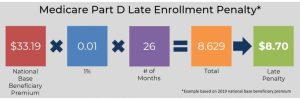What is a Special Needs Plan?
A coordinated care plan (CCP) for Medicare Advantage (MA) known as a special needs plan (SNP) is created expressly to offer tailored treatment and restrict membership to those with special needs. Any of the following could be a person with special needs:
- An institutionalized individual,
- A dual eligible, or
- An individual with a severe or disabling chronic condition, as specified by CMS.
Find Medicare Plans in 3 Easy Steps
We can help get up to $0 monthly premium Medicare plans
Any MA CCP, such as an HMO or HMO Point-of-Service (HMO-POS) plan, a local or regional preferred provider organization (LPPO or RPPO) plan, or a health maintenance organization (HMO) plan, may be an SNP. SNPs come in three different varieties:
- Chronic Condition SNP (C-SNP)
- Dual Eligible SNP (D-SNP)
- Institutional SNP (I-SNP)
Statutory and Regulatory History
An MA CCP was created by the Medicare Modernization Act of 2003 (MMA) primarily to provide specialized treatment to people with exceptional needs. In the MMA, Congress defined “special needs individuals” as: 1) institutionalized people; 2) those who qualify for both Medicare and Medicaid; and/or 3) people who have serious or incapacitating chronic diseases, as determined by CMS. “Specialized MA plans for Specific Needs Individuals,” or SNPs, are MA CCPs created to offer services to these people with special needs. Individuals with exceptional needs and customized MA plans for certain individuals are defined in 42 CFR 422.2. SNPs first became accessible in 2006. The SNP program was granted permission by the MMA to run until December 31, 2008.
The SNP program was then extended from December 31, 2008, to December 31, 2009, by the Medicare, Medicaid, and State Children’s Health Insurance Program (SCHIP) Extension Act of 2007. However, a moratorium was enforced, preventing CMS from accepting new SNPs after January 1, 2008.
In light of this, CMS did not accept SNP applications for the contract year (CY) 2009 in 2008.
The Medicare, Medicaid, and SCHIP Extension Act of 2007’s prohibition on the approval of new SNPs was lifted by the Medicare Improvements for Patients and Providers Act of 2008 (MIPPA). Up to the end of 2010, CMS might accept MA applications for new SNPs and SNP service area expansions thanks to MIPPA’s further extension of the SNP program. In compliance with additional SNP program requirements outlined in MIPPA, CMS accepted SNP applications from MA applicants for developing new SNPs and extending existing CMS-approved SNPs for all three types of specialized SNPs. MIPPA application requirements for SNPs are implemented and further described in CMS rules, which are found at 42 CFR 422.501-504.
The Patient Protection and Affordable Care Act (“ACA”), section 3205, extended the SNP program through December 31, 2013, with effect from the moment it was enacted in 2011.
The SNP program was extended through December 31, 2014 by Section 607 of the American Taxpayer Relief Act of 2012 (ATRA).
The extension of the SNP program through December 31, 2015 was made possible by Section 1107 of the Bipartisan Budget Act of 2013 (Pub. L. 113-67).
The SNP program was prolonged through December 31, 2016, by Section 107 of the Protecting Access to Medicare Act of 2014.
The SNP program was most recently extended through December 31, 2018, according to Section 206 of the Medicare Access and CHIP Reauthorization Act of 2015 (MACRA).
Find Medicare Plans in 3 Easy Steps
We can help get up to $0 monthly premium Medicare plans
Requirements and Payment Procedures
SNPs are expected to adhere to the Prescription Drug Benefit program rules and the current MA program rules, including the MA regulations at 42 CFR 422 as amended by guidance. Because people with special needs need to have access to prescription medications to manage and control their unique health care demands, all SNPs are required to offer Part D prescription drug coverage. If no revision is included in the guidance, SNPs should presume that the Part C and D rules as they are now apply.
The processes used by CMS to pay non-SNP MA plans are also used to make payments to SNPs.
SNPs are paid similarly to other MA plans depending on the plan’s enrollment and risk adjustment payment mechanism, and they must prepare and submit bids like other MA plans.
Current CMS guidance on cost sharing obligations must be followed by all SNPs.
Site Overview
By selecting the relevant links on the left-hand side of this page, you may learn more details about each of the three SNP kinds (C-SNPs, D-SNPs, and I-SNPs), the SNP Application, and the SNP Model of Care. A link to the online Medicare Managed Care Manual is also provided below, and it contains Chapter 16b, which is CMS’s most recent sub-regulatory guidance on SNPs.





